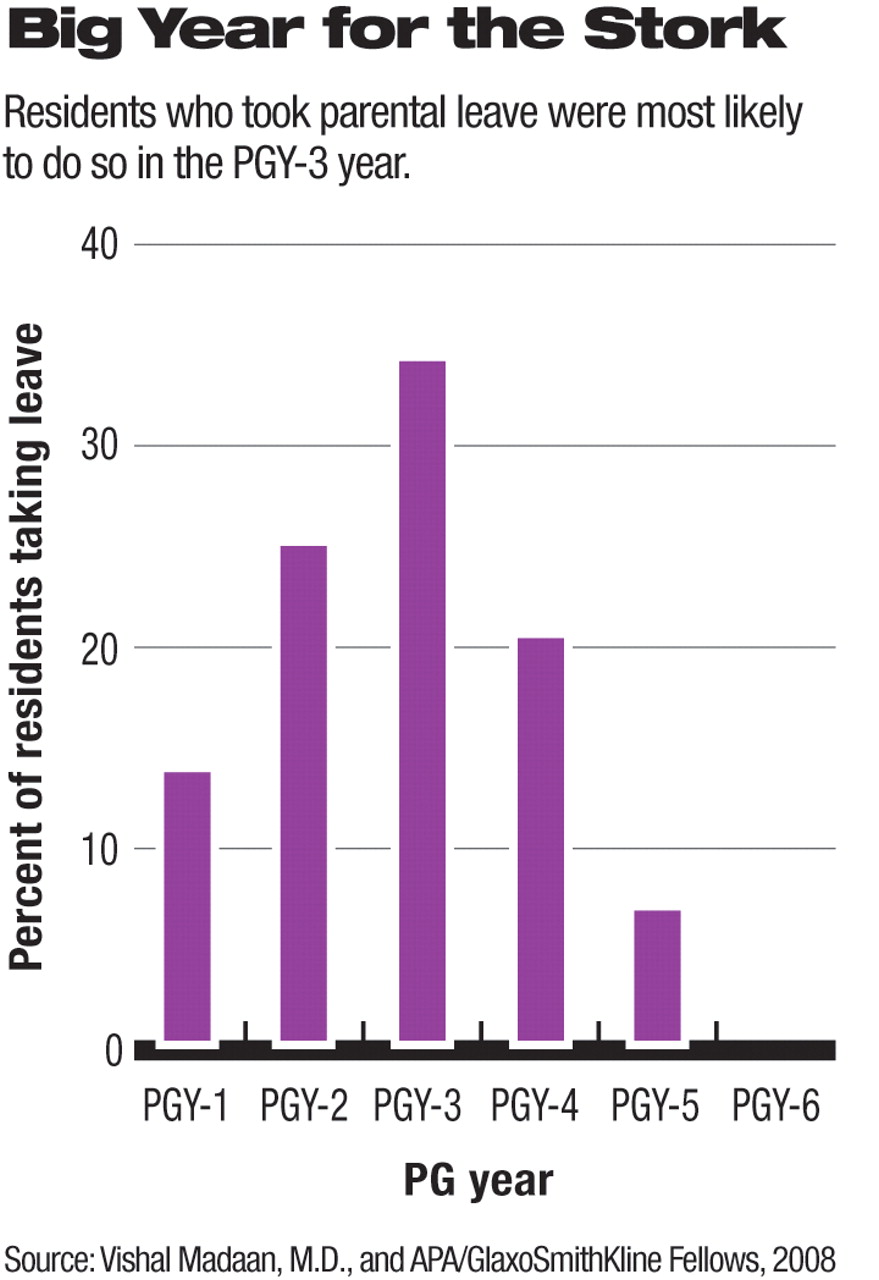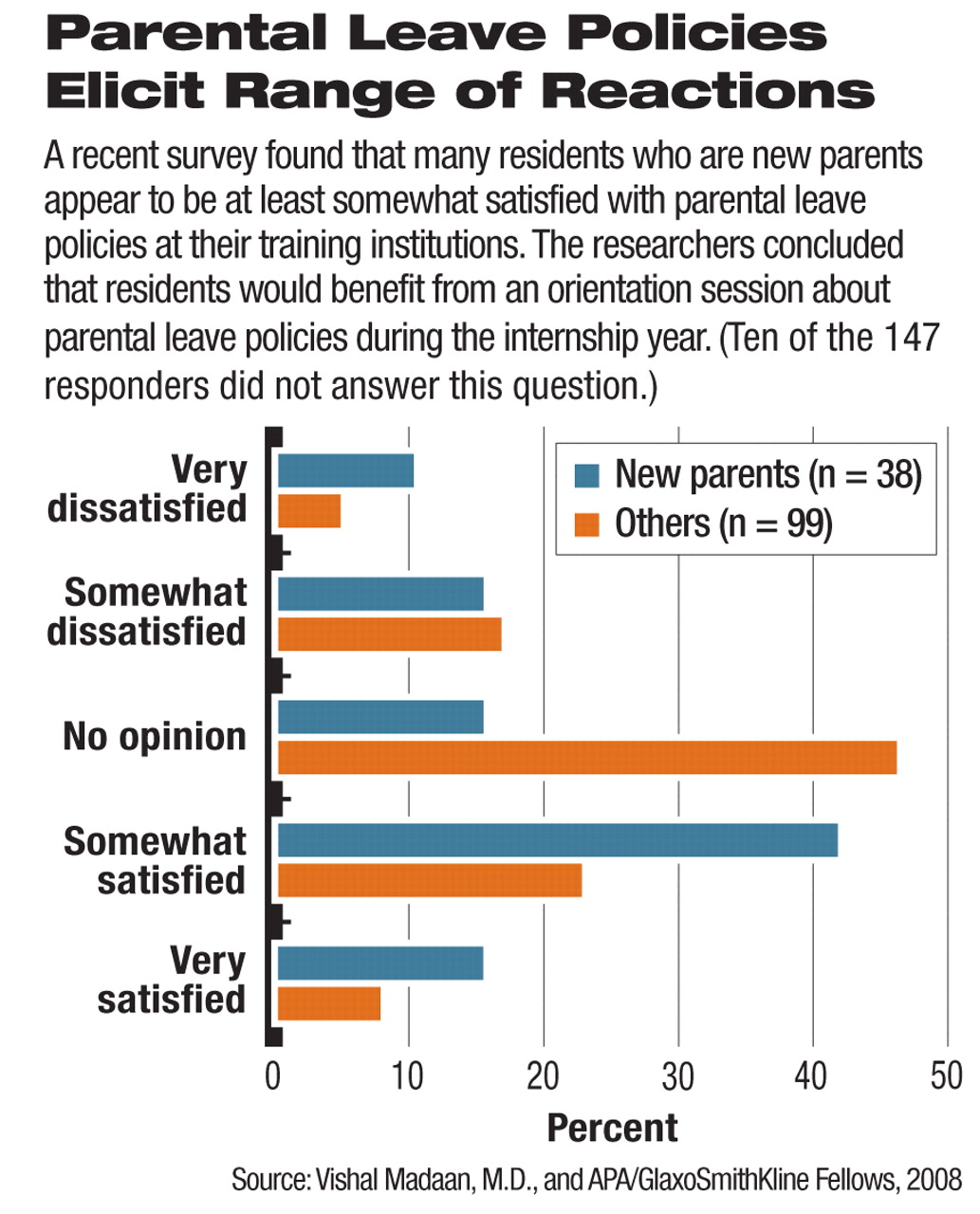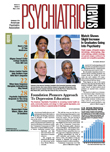Psychiatry residency programs are perceived by residents to be generally supportive of parenting during training, but about 30 percent of residents also said in a recent survey that they are somewhat or very dissatisfied with maternal/paternal leave policies offered by their training institution.
Moreover, pregnancy and parenting during residency appear to be a source of conflict among residents who are parents and residents who are not parents.
Those were some findings from a survey of psychiatry residents at 13 institutions presented at a poster session at the March meeting of the American Association of Directors of Psychiatric Residency Training (AADPRT). The survey was conducted by APA/GlaxoSmithKline Fellows Vishal Madaan, M.D., Joel Johnson, M.D., Keith Stowell, M.D., Rachel Molander, M.D., Anita Khurana, M.D., Joshua Bess, M.D., Robert Oldham, M.D., Glen Davis, M.D., Anna Gross, M.D., and Zachary Freyberg, M.D.
The survey, approved by the Institutional Review Board at Creighton University/University of Nebraska Medical Center, consisted of a 39-item questionnaire on pregnancy and parenting issues during psychiatry residency and on parental-leave policy. It was sent to 537 psychiatry residents and fellows in 13 programs in 10 states. The survey asked trainees about their attitudes toward becoming a parent during residency, their understanding of their institution's parental-leave policy, new parents' experience, and the availability of amenities for new parents in their program.
(In the second half of their ongoing research, they are also studying the perceptions of training directors regarding parental-leave policy.)
Thirty-eight residents out of 147 respondents had become parents during training, and 13 of these new parents were required to extend their training for a certain period, mostly from a few weeks to 20 week. At least one resident, however, was required to extend her training by a year. Moreover, 11 of the 13 who had to extend their training were women, suggesting a disproportionate burden shared by female residents.
“One of our most important findings was the lack of consistency in parental-leave policies across the various training programs in the country,” Vishal Madaan, M.D., who presented the poster at the AADPRT meeting, told Psychiatric News. Madaan is a resident at Creighton University/University of Nebraska Medical Center.
“In fact,” he continued, in addition to having their training extended, “most 'new parents' in residency had to utilize their vacation and sick leave as a part of their parental leave.... This does not happen in Canada, where, for instance, new parents are given more than 12 weeks leave along with salary and benefits.”
The average age of new parents was 34 and for residents who were not parents, 31. “Most of the residents who were parents were older, married, and white,” Madaan said.
“The other important finding was that residents who were not new parents expressed some resentment about fellow residents who were given leave, since the added workload was left on them,” Madaan said. “This suggests that the current system creates some conflict among the various stakeholders—the residents who are new parents, their families, co-residents who are not new parents, training directors who try to ensure fairness for all residents, and the clinical sites that benefit from the residents' employment and support them financially.”
A majority of the residents who took family leave did so during PGY-3. New parents wished for a longer family leave and better salary support, and residents in general felt the need for formal information regarding parental-leave policy, development of a paternal leave policy, and improvements in existing policy to reduce the burden on other residents.
Madaan and colleagues offered several possible solutions for training institutions and residency directors. Prominent among these was to offer an orientation session about parental-leave policies during the internship year.
“Many of the residents, including those who were not parents, expressed a wish to be better advised about what the policies were at their institutions,” he said.
Other solutions include allowing greater flexibility with rotations and call schedules, part-time work and job sharing, and allowing residents on leave to attend didactic lectures.
The survey authors also recommended that training programs could offer breast-feeding support and accessible daycare.
Madaan said the APA/GlaxoSmithKline fellows were writing an action paper for the APA Assembly on pregnancy and parenting during residency.
“Given the changing demographics of psychiatry residents and medical students, especially with increasing numbers of females, we thought this was a really important area for us to explore,” he told Psychiatric News. ▪


